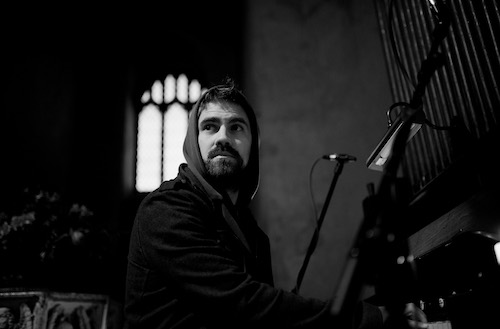Jan 13, 2026 2:09 PM
More Trump-Kennedy Center Cancellations
The fallout from the renaming of the John F. Kennedy Center for the Performing Arts to include President Donald…

Kit Downes’ Obsidian has taken the keyboardist’s career full-circle.
(Photo: ©Alex Bonney/ECM Records)Kit Downes has spent the past decade establishing himself as one of the U.K. jazz scene’s foremost talents on multiple keyboard instruments, playing with a range of groups, including the band Empirical and the fusion trio Troyka, and regularly collaborating with drummer Seb Rochford, as well as saxophonist Tom Challenger.
Downes’ musical beginnings involved another instrument, though: the voice. Singing as a child in a choir in his hometown of Norwich in northeast England, he at one point took part in a piece by contemporary classical composer Arvo Pärt. During a rehearsal with the choir, Downes became fascinated with the organ and its array of sounds.
“I remember the organist playing and voicing in different modes, and that’s what got me into improvising,” Downes said. Enamored with improvisation, the classical repertoire was soon replaced with jazz and the piano. “My mum suggested I listen to jazz, and she gave me an Oscar Peterson CD. After that, I didn’t play the organ much more.”
Downes attended the prestigious Purcell Music School before moving to London to study at the Royal Academy of Music, where he now teaches. It has only been in recent years that he’s returned to the organ. In fact, things have gone somewhat full circle with his acclaimed solo organ album, Obsidian, being released in January on Pärt’s longtime label, ECM.
The album includes 10 beguiling tracks of eerie organ voicings and ambient texture that straddle the line between gestural jazz improvisation and the gravitas of a classical orchestration. Because the pipe organ is a site-specific instrument, Obsidian is flavored by the three spaces in which it was recorded. The sites were the cavernous Union Chapel in North London and two Sussex structures: Snape’s medieval St. John the Baptist Church and Bromeswell’s St. Edmund Church.
“Coming from Norfolk as a kid, it was great to get on the train on the weekends and go around all different churches and learn the different organs with their own registrations,” he said. “So, in some ways recording Obsidian was a return to that, using the landscape, as well as the indoor setting, for inspiration.”
Much of the music also came from earlier improvisations. “I was taking note of the settings and sounds, and sometimes the only starting point would be a certain grouping of organ stops,” Downes said. “The chaos of the moment was slightly removed, because I had prepared structures in place—but it still felt pretty chaotic, especially since when you’re playing solo, you have to cover a lot of ground.”
The exposition of the solo is the perfect setting for Downes’ delicate playing, giving space to showcase the intricate voicings so often left for other musicians to bounce off of onstage. Challenger admires Downes’ gift for improvisation: “Kit has an incredible work ethic. When you’re playing with him, he’s working incredibly hard to listen and put in whatever the music demands at that point. He’s one of these musicians who really makes things happen, and there’s always grounds for a musical conversation at any given point.”
Downes and Challenger’s two duo albums—Wedding Music (Loop) and Vyamanikal (Slip)—are founded on the basis of stretching and manipulating interpretive moments in post-production. The result is works on saxophone, organ, piano and synthesizer where the moments of instantaneous inception and considered return are blurred into one.
“The ongoing musical relationship I have with Tom is the key part of everything I do,” Downes said. “He pushes me to be strong in my ideas. We have to each put forward a firm opinion and work democratically to carry the ideas forward.”
Part of the strength in these ideas comes from a strange accident Downes had in 2017. “While putting on a sock, I managed to damage a tendon in my left hand, which is ridiculous but true,” he said. “In reaction to that, I wrote a piece every day for two months only for my right hand. Through that process, I had to push myself to not repeat the normal themes of my compositions.” Writing alone and for nothing more than the exercise of composition belies the studious and serious nature of Downes’ approach to music.
“It’s that fine-line balance between self and other, which is the really fun thing about being an improviser,” he said. “You need to strongly be yourself and also be open to new things, and that’s the buzz that keeps us doing it.” DB

Belá Fleck during an interview with Fredrika Whitfield on CNN.
Jan 13, 2026 2:09 PM
The fallout from the renaming of the John F. Kennedy Center for the Performing Arts to include President Donald…

Peplowski first came to prominence in legacy swing bands, including the final iteration of the Benny Goodman Orchestra, before beginning a solo career in the late 1980s.
Feb 3, 2026 12:10 AM
Ken Peplowski, a clarinetist and tenor saxophonist who straddled the worlds of traditional and modern jazz, died Feb. 2…

The success of Oregon’s first album, 1971’s Music Of Another Present Era, allowed Towner to establish a solo career.
Jan 19, 2026 5:02 PM
Ralph Towner, a guitarist and composer who blended multiple genres, including jazz — and throughout them all remained…

Rico’s Anti-Microbial Instrument Swab
Jan 19, 2026 2:48 PM
With this year’s NAMM Show right around the corner, we can look forward to plenty of new and innovative instruments…

Richie Beirach was particularly renowned for his approach to chromatic harmony, which he used to improvise reharmonizations of originals and standards.
Jan 27, 2026 11:19 AM
Richie Beirach, a pianist and composer who channeled a knowledge of modern classical music into his jazz practice,…